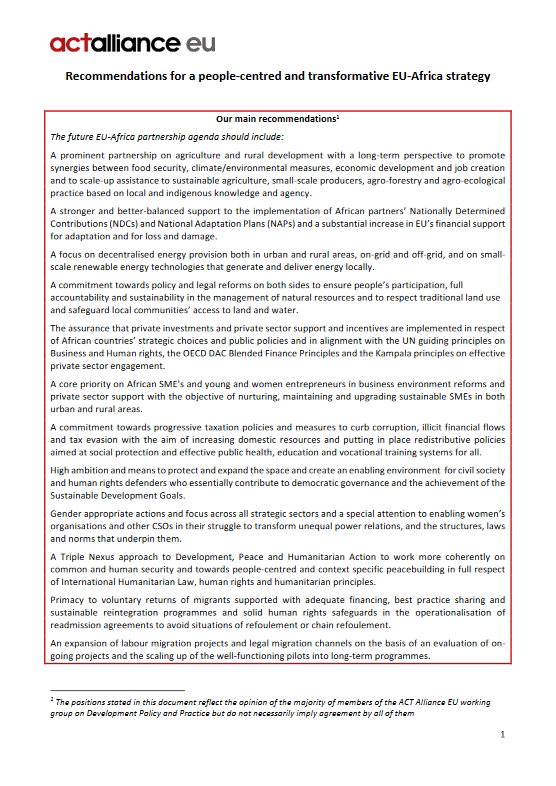This paper is based on ACT Alliance EU’s analysis of the joint EC/EEAS communication, “Towards a comprehensive strategy with Africa“. We believe that a comprehensive EU-Africa strategy must be based on the priorities and objectives of both sides, aiming for mutual support in reaching the goals of the Agenda 2030 and the Paris Agreement on climate change, while respecting the international HRs conventions and global standards countries are party to. It should involve all actors and sectors of cooperation, including civil society organisations and community-led initiatives so that no one is left behind.
Our paper was developed in light of the current COVID-19 crisis that creates new challenges for both continents and highlights the need for a fairer, people-centred partnership. It is the occasion to re-think the relationship in all its aspects, addressing not only the impacts and lessons from the crisis but also its structural causes. Our recommendations aim to contribute to that reflection with the vision to create open, equitable, and resilient societies that have the resources and flexibility to react to crises and mitigate their consequences.
Our main recommendations
The future EU-Africa partnership agenda should include:
- A prominent partnership on agriculture and rural development with a long-term perspective to promote synergies between food security, climate/environmental measures, economic development, and job creation and to scale-up assistance to sustainable agriculture, small-scale producers, agro-forestry, and agro-ecological practice based on local and indigenous knowledge and agency.
- A stronger and better-balanced support for the implementation of African partners’ Nationally Determined Contributions (NDCs) and National Adaptation Plans (NAPs) and a substantial increase in the EU’s financial support for adaptation and loss and damage.
- A focus on decentralised energy provision both in urban and rural areas, on-grid and off-grid, and on small-scale renewable energy technologies that generate and deliver energy locally.
- A commitment towards policy and legal reforms on both sides to ensure people’s participation, full accountability, and sustainability in the management of natural resources and respect traditional land use and safeguard local communities’ access to land and water.
- The assurance that private investments and private sector support and incentives are implemented in respect of African countries’ strategic choices and public policies and alignment with the UN guiding principles on Business and Human rights, the OECD DAC Blended Finance Principles, and the Kampala principles on effective private sector engagement.
- A core priority for African SMEs and young and women entrepreneurs in business environment reforms and private sector support is to nurture, maintain, and upgrade sustainable SMEs in both urban and rural areas.
- A commitment towards progressive taxation policies and measures to curb corruption, illicit financial flows, and tax evasion to increase domestic resources and put in place redistributive policies aimed at social protection and effective public health, education, and vocational training systems for all.
- High ambition and means to protect and expand the space and create an enabling environment for civil society and human rights defenders who essentially contribute to democratic governance and the achievement of the Sustainable Development Goals.
- Gender-appropriate actions and focus across all strategic sectors and special attention to enabling women’s organisations and other CSOs in their struggle to transform unequal power relations and the structures, laws, and norms that underpin them.
- A Triple Nexus approach to Development, Peace, and Humanitarian Action to work more coherently on common and human security and towards people-centred and context-specific peacebuilding in full respect of International Humanitarian Law, human rights, and humanitarian principles.
- Primacy to voluntary returns of migrants supported with adequate financing, best practice sharing, sustainable reintegration programmes and solid human rights safeguards in the operationalisation of readmission agreements to avoid situations of refoulement or chain refoulement.
- An expansion of labour migration projects and legal migration channels based on an evaluation of ongoing projects and the scaling up of the well-functioning pilots into long-term programmes.
